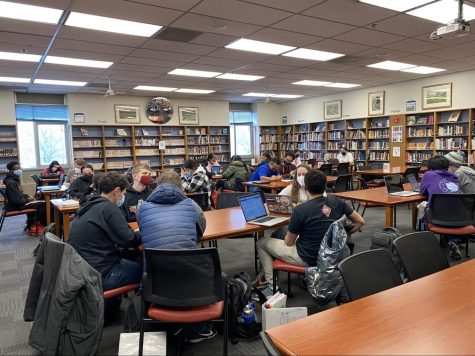Trump’s Federal Reserve Appointments
April 23, 2019
Another day another controversy
around the Trump administration.
This time it isn’t just knee jerk reactions from the left, but something
deeply troubling. Trump is violating another presidential norm,
he’s making the Federal Reserve
political. Traditionally, the Federal
Reserve is a non-partisan organization, regulating the monetary
policy of the country: that is, they
manage the interest rate, the rate at
which people and banks can borrow money. The exact specifics of
this process are not important, but
what is important is their tight lips:
because they control something
so central to the economy, money,
even a single misplaced word (or in
the case of current Federal Reserve
chair Jerome Powell, two) can send
the market either plummeting or
sky rocketing. The Fed need to be
tight lipped. They also need to be
non-partisan, not on the side of
either party. They need to do what
is most effective for the economy,
not what might be best for a particular party or candidate. Recently,
Powell, a Trump appointee, burned
the Presidency by raising interest
rates.
Trump is shaking all of
this up. His two appointees, Stephen Moore and Herman Cain are
neither tight lipped, nor non-partisan. They are both, for lack of a
better word, Trump lackies. And
even setting that aside, they have
some fairly wild ideas about the
economy. Moore has proposed
abolishing the Federal Reserve all
together. And Herman Cain, well…
Herman Cain isn’t really qualified
at all. Moore can at least claim the
appearance of being an economist
(he’s never published any economic papers, nor even received a
PhD in economics), but Cain has
received no economic education.
He had a short stint at the Federal
Reserve Bank of Kansas City, but
besides that his main experience is
as a CEO and businessman. Certainly being in business gives one
some economic inclinations, but
the Federal Reserve needs education and understanding, not inclination.
At this point, it may be
worth explaining why the Federal
Reserve Bank is so important, and
not only for our economy, but for
many economies around the world.
The Federal Reserve bank regulates monetary policy — the interest
rate at which people can borrow.
This number has a significant impact on the operating of the economy. The interest rate will determine
how many new business crop up:
the higher the interest rate, the less
likely entrepreneurs are going to
be to take on the risk of running a
business. A higher interest rate, a
slower economy. Vice versa, a lower interest rate, a faster economy.
But this tap dance is not so simple:
the Fed also have to be aware of inflation, that is, the rate at which are
currency is losing value. Currently,
inflation is at a low of around 1
percent, but drop the interest rate
too low and it could have disastrous consequences. Similarly, the
Fed need to be aware of how far
they drop the interest rate. If they
drop it too far and a recession hits,
they won’t have any redress for
reinvigorating the economy. The
Fed has a delicate job, and one that
requires not only precise leaders
but precise members. The integrity of the American, and indeed
international economies, relies on
the seven board members. Even a
couple of bad sailors could sink the
whole ship.
